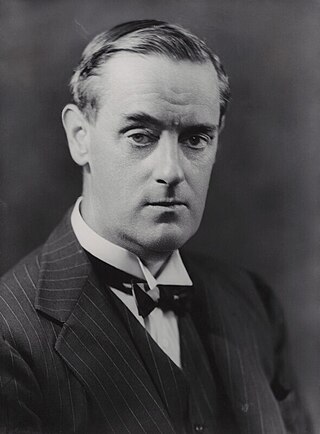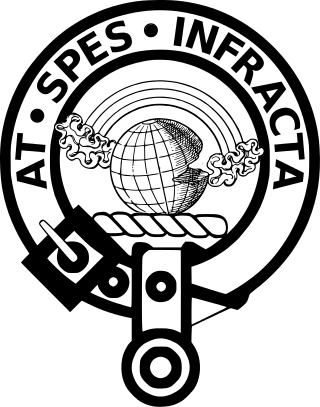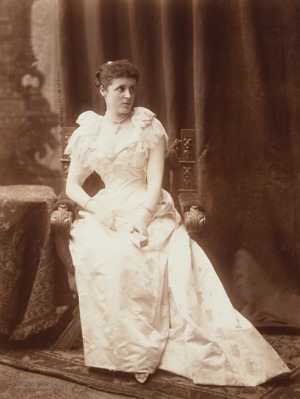Related Research Articles

Archibald Philip Primrose, 5th Earl of Rosebery, 1st Earl of Midlothian, was a British Liberal Party politician who served as Prime Minister of the United Kingdom from March 1894 to June 1895. Between the death of his father, in 1851, and the death of his grandfather, the 4th Earl of Rosebery, in 1868, he was known by the courtesy title of Lord Dalmeny.
The Peerage of the United Kingdom is one of the five Peerages in the United Kingdom. It comprises most peerages created in the United Kingdom of Great Britain and Ireland after the Acts of Union in 1801, when it replaced the Peerage of Great Britain. New peers continued to be created in the Peerage of Ireland until 1898

Marquess of Linlithgow, in the County of Linlithgow or West Lothian, is a title in the Peerage of the United Kingdom. It was created on 23 October 1902 for John Hope, 7th Earl of Hopetoun. The current holder of the title is Adrian Hope.

Earl of Rosebery is a title in the Peerage of Scotland created in 1703 for Archibald Primrose, 1st Viscount of Rosebery, with remainder to his issue male and female successively. Its name comes from Roseberry Topping, a hill near Archibald's wife's estates in Yorkshire. The current earl is Harry Primrose, 8th Earl of Rosebery.

Victor Alexander John Hope, 2nd Marquess of Linlithgow, was a British Unionist politician and statesman, agriculturalist, and colonial administrator. He served as Governor-General and Viceroy of India from 1936 to 1943. He also served as vice president of the Royal Society of Edinburgh, Chancellor of the University of Edinburgh and Lord High Commissioner to the General Assembly of the Church of Scotland. He was usually referred to as LordLinlithgow, or simply Linlithgow.
This is a list of people who have served as Lord Lieutenant of Midlothian.

The Lord High Commissioner to the General Assembly of the Church of Scotland is the monarch's personal representative to the General Assembly of the Church of Scotland, reflecting the Church's role as the national church of Scotland and the monarch's role as protector and member of that Church. In its history, the office holder has been the personal representatives to all Scottish monarchs, and later British monarchs, following the Union of the Crowns.

Clan Hope is a Scottish clan of the Scottish Lowlands.
Archibald Primrose, Lord Dalmeny, was a British Whig politician.

Clan Primrose is a Lowland Scottish clan.

John Hope, 2nd Earl of Hopetoun was a Scottish aristocrat.

There have been four baronetcies created for persons with the surname Hope, three in the Baronetage of Nova Scotia and one in the Baronetage of the United Kingdom. As of 2010 one creation is extant, one dormant and two extinct.

General John Hope, 4th Earl of Hopetoun,, known as The Honourable John Hope from 1781 to 1814 and as Lord Niddry from 1814 to 1816, was a Scottish politician and British Army officer.

James Hope-Johnstone, 3rd Earl of Hopetoun FRSE was a Scottish peer, politician and military officer.

Adrian John Charles Hope, 4th Marquess of Linlithgow, styled Viscount Aithrie until 1952 and Earl of Hopetoun between 1952 and 1987, is a British noble. His family seat is Hopetoun House, near Edinburgh, Scotland. He was educated at Eton College.
Events from the year 1703 in the Kingdom of Scotland.
The Dunbar, later Hope-Dunbar Baronetcy, of Baldoon, is a title in the Baronetage of Nova Scotia. It was created on 13 October 1664 for David Dunbar, with remainder to his heirs male and tailzie. The baronetcy became dormant on his death in 1686. The title remained dormant until 1916, when it was successfully claimed by Charles Hope-Dunbar, who became the sixth Baronet. He was a descendant of Mary, granddaughter and sole heiress of the first Baronet. Hope-Dunbar was also the grandson of the Hon. Charles Hope, third son of John Hope, 4th Earl of Hopetoun. Consequently, the present holder of the baronetcy is also in remainder to the earldom of Hopetoun and its subsidiary titles the viscountcy of Aithrie, lordship of Hope and baronetcy of Kirkliston, titles held by his kinsman the Marquess of Linlithgow.

Hersey Alice Hope, Marchioness of Linlithgow was a British aristocrat, who was the wife of John Hope, 1st Marquess of Linlithgow, who, as the 7th Earl of Hopetoun, was the first Governor-General of Australia 1901 – 1903.

Catherine Lucy Wilhelmina Powlett, Duchess of Cleveland, also known as Lady Dalmeny and Lady Harry Vane, was an English courtier, historian and genealogist, best known for her 1889 work The Battle Abbey Roll with some Account of the Norman Lineages.
References
- Sainty, J. C. "Lieutenants and Lord-Lieutenants of Counties (Scotland) 1794-" . Retrieved 10 February 2018.